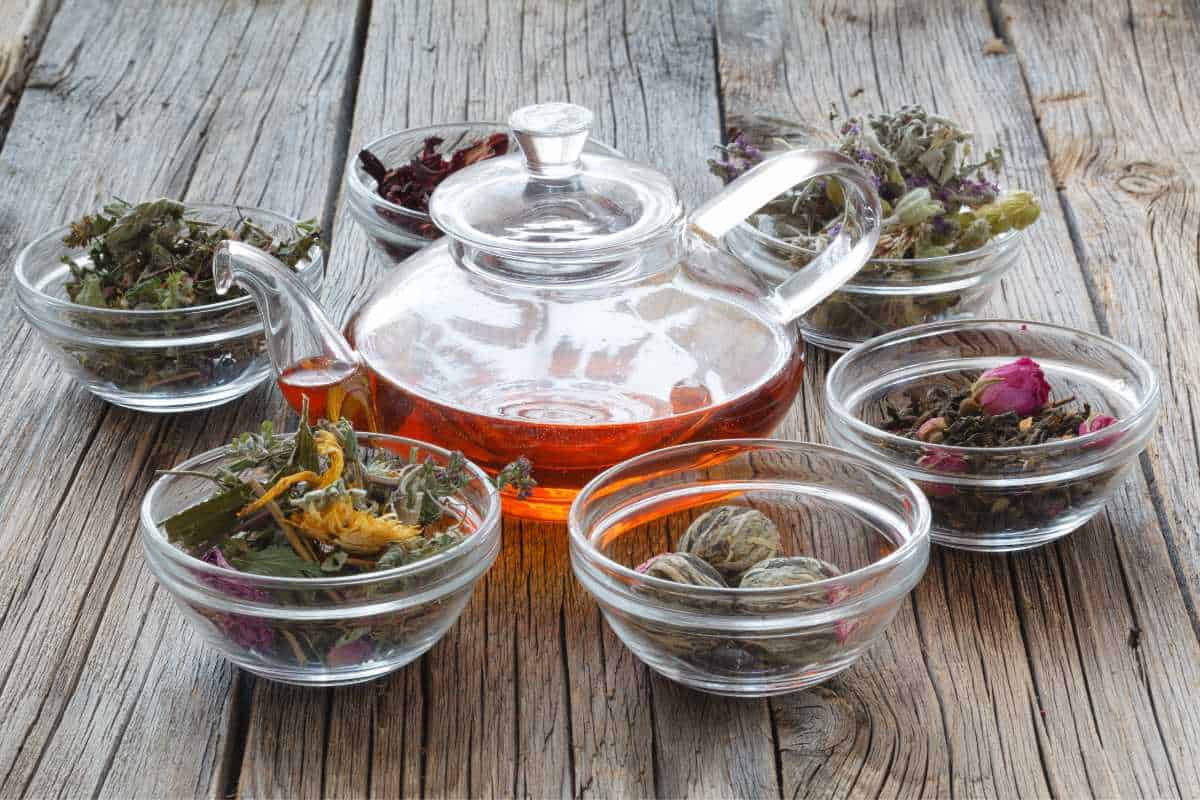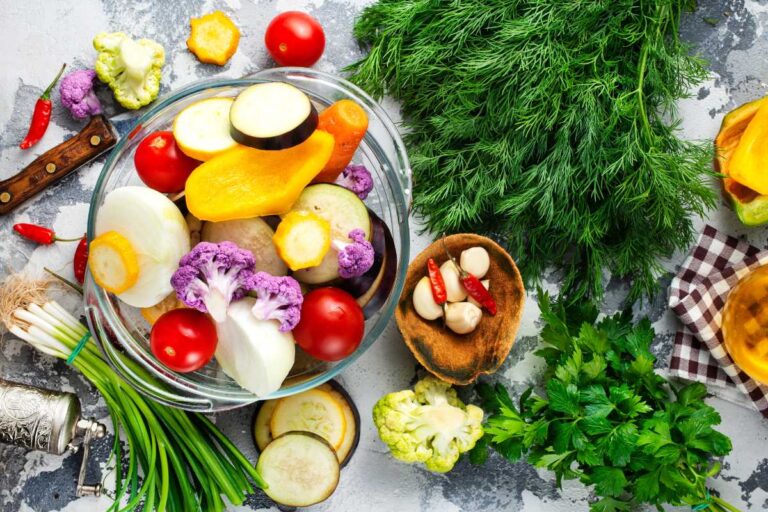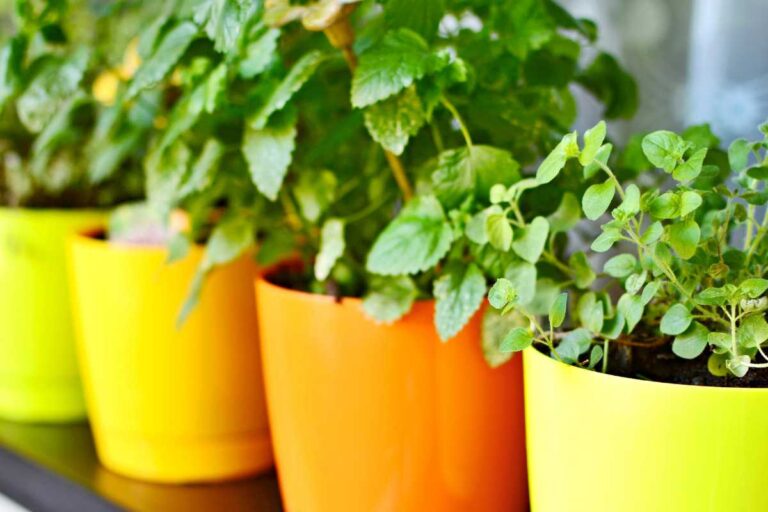The Best Herbs to Grow for Medicinal Use – A Comprehensive Guide to the Top 15 Medicinal Herbs
The Best Herbs to Grow for Medicinal Use – A Comprehensive Guide to the Top 15 Medicinal Herbs

Discover the power of nature’s healing with medicinal herbs. In ancient times, people relied on the therapeutic properties of herbs for health and wellness. Today, this practice continues to thrive as more individuals recognize the benefits of cultivating their own medicinal herb gardens.
The world of medicinal herbs is vast and diverse, offering a range of plants with remarkable healing properties.
From soothing chamomile to immune-boosting echinacea, there is a great herb for every ailment. These medicinal plants have been used for centuries in various forms such as remedies, tinctures, or even consumed directly.
Growing your own medicinal herbs can be immensely rewarding. Not only do you have access to fresh and potent ingredients for natural remedies, but it also allows you to take control of your health and well-being.
By cultivating an herb garden, you can harness the power of herbal polyculture – combining different plants that complement each other’s growth and medicinal properties.
Join us as we delve into the fascinating world of medicinal herbs and explore how they can enhance your life. Get ready to unlock the secrets of nature’s medicine cabinet!
| Medicinal Herb | Short Explanation |
|---|---|
| 1. Aloe Vera | Known for its healing properties and commonly used to treat burns and skin irritations. |
| 2. Chamomile | Has calming effects and is often used to promote relaxation and relieve anxiety. |
| 3. Echinacea | Boosts the immune system and helps fight off infections and common colds. |
| 4. Lavender | Known for its soothing scent and is used to promote relaxation and improve sleep quality. |
| 5. Peppermint | Helps with digestion issues such as bloating and indigestion. Also provides relief from headaches. |
| 6. Sage | Known for its antimicrobial properties and is often used to treat sore throats and mouth ulcers. |
| 7. Thyme | Contains compounds that help fight respiratory infections and improve respiratory health. |
| 8. Rosemary | Improves memory and concentration, and also has antioxidant and anti-inflammatory properties. |
| 9. Calendula | Used to treat skin conditions such as rashes, wounds, and inflammation. |
| 10. Ginger | Helps with nausea, digestive issues, and has anti-inflammatory effects. |
| 11. Turmeric | Has powerful anti-inflammatory properties and is often used to relieve joint pain and inflammation. |
| 12. Lemon Balm | Known for its calming effects and is used to reduce anxiety and promote relaxation. |
| 13. Dandelion | Supports liver health and aids in detoxification. Also acts as a diuretic. |
| 14. St. John’s Wort | Used to treat depression and improve mood. |
| 15. Valerian | Helps with insomnia and promotes better sleep quality. Also has calming effects. |
Tired of struggling with outdoor herb gardens in unpredictable weather? Discover the secret to successful herbal gardening indoors and enjoy fresh herbs year-round. Check out our article now!
Benefits and Uses of Gingko, Tea Tree Oil, and Lavender
Gingko: Boost brain function and improve memory with this ancient herb.
Gingko, derived from the leaves of the gingko tree, has been used for centuries in traditional medicine. One of its most notable benefits is its ability to boost brain function and improve memory.
Research suggests that gingko extract can enhance cognitive performance by increasing blood flow to the brain and protecting neurons from damage.
In addition to its memory-enhancing properties, gingko also exhibits antioxidant effects. This means it can help fight off harmful free radicals in the body, reducing oxidative stress and inflammation.
Furthermore, studies have shown that gingko may aid in reducing symptoms associated with anxiety and depression.
To incorporate gingko into your routine, you can find it in various forms such as capsules or liquid extracts. It’s important to consult a healthcare professional before starting any new herbal supplement regimen.
Tea Tree Oil: Harness the antibacterial properties of tea tree oil for skincare and wound healing.
Tea tree oil is renowned for its powerful antibacterial properties, making it a popular ingredient in skincare products. Its natural antimicrobial activity helps combat acne-causing bacteria on the skin, making it an effective treatment for blemishes. Tea tree oil can assist in soothing inflammation caused by skin conditions like eczema or psoriasis.
When used topically, tea tree oil aids in wound healing by preventing infection and promoting tissue repair. It acts as a natural antiseptic that cleanses minor cuts and scrapes while reducing redness and swelling. However, it’s crucial to dilute tea tree oil before applying it directly to the skin to avoid irritation.
For those seeking an alternative remedy for scalp issues such as dandruff or itchiness, tea tree oil shampoos are available commercially. These products harness the benefits of tea tree oil while providing relief from common scalp conditions.
Lavender: Experience relaxation and better sleep through the soothing effects of lavender.
Lavender, with its calming aroma, is widely recognized for its ability to induce relaxation and improve sleep quality. The scent of lavender has been shown to reduce anxiety levels and promote a sense of calmness. Many individuals find that incorporating lavender into their bedtime routine helps them unwind and prepare for a restful night’s sleep.
In addition to its aromatic benefits, lavender also possesses antimicrobial properties. It can be used topically to soothe skin irritations or minor burns. Furthermore, studies have suggested that lavender may aid in alleviating symptoms associated with migraine headaches.
To enjoy the benefits of lavender, you can use essential oils in a diffuser or add a few drops to your bathwater for a relaxing soak. Alternatively, dried lavender flowers can be used to make sachets or pillows that release the calming scent throughout the day or night.
Thyme (Thymus vulgaris) and its Medicinal Uses
Thyme, with its aromatic leaves and delicate purple flowers, is not just a flavorful herb used in cooking. It also boasts numerous medicinal properties that have been utilized for centuries. From combating respiratory issues to treating skin infections, thyme has proven itself as a valuable herb for natural remedies.
Combat respiratory issues like coughs, colds, and bronchitis with thyme.
Thyme has long been hailed as an effective herbal remedy. Its active compounds, such as thymol and carvacrol, possess expectorant properties that help alleviate coughs and congestion. Thyme can be consumed in various forms to soothe the respiratory system.
One popular method is brewing thyme tea by steeping fresh or dried thyme leaves in hot water for several minutes. This warm infusion can provide relief from persistent coughs caused by colds or bronchitis.
Thyme’s antiseptic properties make it an effective natural remedy for sore throats.
Sore throats can be incredibly uncomfortable, but thyme offers a natural solution to ease the pain. The antiseptic qualities of thyme help kill harmful bacteria present in the throat while reducing inflammation.
Gargling with a warm thyme tea or using a throat spray containing thyme oil can provide soothing relief for sore throats. The antibacterial properties of thyme may aid in preventing further infection.
Discover thyme’s potential as a digestive aid to relieve indigestion and bloating.
Indigestion and bloating are common digestive ailments that can cause discomfort after meals. Fortunately, incorporating thyme into your diet may offer some relief. Thymol, one of the key compounds found in thyme, helps relax gastrointestinal muscles and promotes healthy digestion.
Whether added to dishes as a culinary herb or taken as a supplement, thyme can aid in reducing indigestion and bloating.
Harness thyme’s antimicrobial properties to treat skin infections naturally.
Thyme’s antimicrobial properties extend beyond its internal benefits. The herb can also be used topically to combat various skin infections. Thyme oil, when diluted with a carrier oil like coconut or olive oil, can be applied to wounds, cuts, or insect bites to prevent infection and promote healing.
Its antifungal properties make it useful in treating conditions like athlete’s foot or nail fungus as well. However, it is important to perform a patch test before applying thyme oil directly onto the skin to ensure there are no adverse reactions.
Incorporating thyme into your medicinal herb garden not only adds flavor to your culinary creations but also provides a natural remedy for respiratory issues, sore throats, digestive discomforts, and skin infections.
Whether consumed as an herbal tea or used externally as an essential oil, thyme has proven itself as one of the best herbs for medicinal purposes.
Chamomile’s Medicinal Benefits and Uses
Chamomile, a small daisy-like flower with a delicate aroma, has been cherished for centuries due to its remarkable medicinal benefits and healing properties. This versatile herb offers a myriad of health benefits that make it an essential addition to any wellness routine.
From inducing calmness and reducing anxiety to soothing skin conditions, chamomile proves its worth as one of the best herbs to grow for medicinal use.
Induce Calmness, Reduce Anxiety, and Promote Better Sleep with Chamomile Tea
One of the most well-known uses of chamomile is its ability to promote relaxation and combat anxiety. The fragrant chamomile tea has been used as a natural remedy for stress relief for ages.
Sipping on a warm cup of chamomile tea before bed can work wonders in calming your mind, easing tension, and improving sleep quality. Its mild sedative properties help relax the muscles and soothe the nervous system, allowing you to unwind after a long day.
Relieve Menstrual Cramps by Incorporating Chamomile into Your Wellness Routine
Ladies who suffer from painful menstrual cramps can find solace in chamomile’s therapeutic effects. This herb possesses anti-inflammatory properties that can alleviate discomfort associated with menstrual cramps.
By incorporating chamomile into your wellness routine during your cycle, you may experience reduced pain levels and improved overall well-being. Whether consumed as tea or applied topically in oil form, chamomile can provide much-needed relief during those challenging days.
Discover Chamomile’s Anti-Inflammatory Properties That Can Help Soothe Skin Conditions like Eczema or Psoriasis
Chamomile’s healing abilities extend beyond internal ailments; it also works wonders when applied externally to treat various skin conditions. Its anti-inflammatory properties make it particularly effective in soothing skin irritations such as eczema or psoriasis.
Chamomile’s gentle nature helps reduce redness, itchiness, and inflammation, providing a soothing balm for troubled skin. Incorporating chamomile-infused lotions or creams into your skincare regimen can offer significant relief and promote healthier skin.
Chamomile’s benefits don’t stop there; it has been used to ease upset stomachs and alleviate toothaches as well.
Its mild sedative properties make it an excellent choice for calming digestive discomfort, while its antibacterial properties can help combat oral infections when used as a mouth rinse.
Dill (Anethum graveolens) and its Medicinal Uses
Dill, also known as Anethum graveolens, is a versatile herb that offers numerous medicinal benefits. From aiding digestion to promoting healthy kidney function, dill has been used for centuries as a natural remedy for various ailments.
Ease Digestion Issues
One of the key benefits of dill is its ability to ease digestive problems such as gas, bloating, or stomach cramps. Both dill seeds and leaves can be used to alleviate these discomforts.
The essential oils present in dill help relax the muscles in the gastrointestinal tract, reducing spasms and relieving indigestion. To reap these benefits, you can consume dill tea made from steeping the seeds or add fresh dill leaves to your meals.
Diuretic Properties
Dill acts as a diuretic, meaning it promotes healthy kidney function by increasing urine production. This helps flush out toxins from the body and prevent water retention. If you’re looking to support your kidneys naturally, incorporating dill into your diet can be beneficial.
Whether you choose to consume it as an ingredient in salads or infuse it into water for a refreshing beverage, dill’s diuretic properties can help maintain optimal kidney health.
Natural Bad Breath Remedy
Nobody likes dealing with bad breath after enjoying a meal. Luckily, chewing on dill seeds or leaves can mitigate this problem naturally. Dill contains antimicrobial compounds that combat bacteria responsible for causing bad breath. By chewing on some fresh dill after meals, you can freshen your breath without relying on artificial mouthwashes or mints.
In addition to these specific talking points about dill’s medicinal uses, it’s worth noting that this herb shares similarities with anise due to their shared flavor profiles and potential health benefits.
Remember that when using herbs for medicinal purposes, it’s important to consult with a healthcare professional or herbalist to ensure proper usage and avoid any potential interactions or adverse effects.
Incorporating dill into your daily routine can provide you with these natural health benefits. Whether you choose to grow it in your garden or purchase it from a local market, dill is an excellent herb to have on hand for both culinary and medicinal purposes. So why not explore the wonders of dill and harness its potential for improving digestion, supporting kidney health, and freshening your breath?
Medicinal Herb Seeds: Flax Seed and Grapeseed Extract Benefits
Flax seeds and grapeseed extract are two powerful medicinal herbs that offer a range of health benefits. By incorporating these natural remedies into your diet, you can enhance your well-being and address various health concerns.
Flax Seeds: Promoting Heart Health and Reducing Inflammation
One of the key benefits of flax seeds is their rich content of omega-3 fatty acids. These essential fats play a crucial role in maintaining heart health by reducing the risk of cardiovascular diseases.
Omega-3 fatty acids have been shown to lower blood pressure, decrease triglyceride levels, and prevent the formation of harmful blood clots. By including flax seeds in your daily routine, you can support a healthy heart and reduce the likelihood of developing heart-related complications.
In addition to their cardiovascular advantages, flax seeds also possess anti-inflammatory properties. Chronic inflammation has been linked to numerous health issues, including arthritis, diabetes, and even cancer.
The omega-3 fatty acids found in flax seeds can help alleviate inflammation throughout the body, providing relief for those suffering from inflammatory conditions.
Grapeseed Extract: Harnessing Antioxidant Power
Grapeseed extract is renowned for its potent antioxidant properties. Antioxidants are substances that protect our cells from damage caused by free radicals – unstable molecules that contribute to aging and disease development.
By consuming grapeseed extract regularly, you can fortify your body’s defense against free radicals and reduce oxidative stress.
Moreover, grapeseed extract has demonstrated promising effects on various aspects of human health. Studies suggest that it may aid in improving circulation, regulating blood sugar levels, supporting brain function, and enhancing skin health. This versatile herbal remedy offers a holistic approach to wellness with its wide-ranging benefits.
Incorporating Flax Seeds for Digestive Health
Apart from their cardiovascular benefits mentioned earlier, flax seeds can also promote healthy digestion. These tiny seeds are an excellent source of dietary fiber, which aids in maintaining regular bowel movements and preventing constipation. By incorporating flax seeds into your diet, you can support a healthy digestive system and alleviate discomfort associated with irregularity.
To enjoy the benefits of flax seeds, you can easily incorporate them into your meals. Sprinkle ground flax seeds on cereals or yogurt, add them to smoothies or baked goods, or use them as a topping for salads. The versatility of flax seeds allows you to experiment with different recipes and find enjoyable ways to reap their health advantages.
Wild Bergamot (Monarda fistulosa) and Lemon Balm (Melissa officinalis) for Medicinal Purposes
Wild bergamot, also known as Monarda fistulosa, is a remarkable herb that offers various health benefits. One of its primary uses is in relieving cold symptoms, including congestion and sore throat. The leaves of wild bergamot contain essential oils that have antimicrobial properties, making it an excellent natural remedy for respiratory ailments.
Lemon balm, scientifically known as Melissa officinalis, is another herb with incredible medicinal properties. Its calming effects make it a popular choice for reducing anxiety and stress. Lemon balm has been used for centuries to promote relaxation and improve sleep quality. Recent studies have discovered lemon balm’s antiviral properties that can aid in the treatment of cold sores.
You’ll find that they are relatively easy to cultivate. Both wild bergamot and lemon balm thrive in well-drained soil and require moderate sunlight exposure. You can start by obtaining seeds or purchasing young plants from a local garden center.
To grow wild bergamot:
- Choose a sunny spot in your garden with well-drained soil.
- Sow the seeds directly into the ground or start them indoors before transplanting.
- Water the plants regularly but avoid overwatering to prevent root rot.
- Harvest the leaves when they are fully grown but before flowering for optimal flavor and potency.
To grow lemon balm:
- Select a location with partial shade as lemon balm prefers some protection from direct sunlight.
- Plant the seeds or seedlings about 12 inches apart in moist soil.
- Keep the soil consistently damp but not waterlogged.
- Prune regularly to encourage bushier growth and increase leaf production.
In addition to wild bergamot and lemon balm, there are several other herbs you can consider growing for medicinal purposes. Calendula, also known as marigold, has anti-inflammatory properties and is often used in skincare products. Rosemary is a versatile herb with antioxidant and antimicrobial properties that can be used for digestive issues and memory enhancement.
Goldenseal is renowned for its immune-boosting effects and can be beneficial in treating infections. Peppermint is excellent for soothing digestive discomfort, while passionflower helps promote relaxation and relieve insomnia.
The essential oil derived from ocimum tenuiflorum, commonly known as holy basil or tulsi, has been used in traditional medicine to alleviate stress and improve respiratory health.
Other herbs to consider include lemon verbena, hyssop, purple sage, spilanthes, sage, mint varieties like spearmint and peppermint, gingko biloba for cognitive support, and marshmallow leaves for soothing respiratory ailments.
Garlic (Allium sativum) and Cilantro/Coriander (Coriandrum sativum) in Medicinal Use
Garlic and cilantro/coriander are two culinary herbs that not only add flavor to dishes but also offer numerous health benefits. Let’s explore how these herbs can be used for medicinal purposes.
Garlic Boosts the Immune System and Fights Infections
Garlic, known for its pungent aroma and distinctive taste, has been used for centuries as a natural remedy. One of its key medicinal properties is its antimicrobial activity, which helps fight off infections.
The presence of sulfur compounds in garlic, such as allicin, provides it with potent antibacterial and antifungal properties. Incorporating garlic into your diet can help boost your immune system and ward off common illnesses like colds and flu.
Cilantro/Coriander Supports Detoxification
Cilantro, also known as coriander leaves, is a versatile herb commonly used in cooking around the world. Beyond its culinary uses, cilantro offers several health benefits. It supports liver function by aiding in detoxification processes within the body.
Cilantro has been found to have chelating properties that help eliminate heavy metals from the body. Regular consumption of cilantro can contribute to overall detoxification and promote better health.
Lower Blood Pressure Naturally with Garlic
High blood pressure is a common health concern worldwide, often requiring medication to manage it effectively. However, incorporating garlic into your diet may provide a natural way to lower blood pressure levels.
Studies have shown that garlic can help reduce systolic blood pressure by dilating blood vessels and improving circulation. Including garlic in your meals or taking garlic supplements may serve as an adjunctive therapy for hypertension management.
Both garlic and cilantro are relatively easy to cultivate:
- Garlic: Plant garlic cloves in well-drained soil during the fall season. Ensure they receive adequate sunlight and water regularly. Harvest the bulbs when the leaves start to wither, usually around mid-summer.
- Cilantro/Coriander: Sow cilantro seeds directly into the garden or a pot as they do not transplant well. Provide them with partial shade and moist soil. Harvest the leaves once they reach a desirable size, before they bolt and produce flowers.
Apart from their individual benefits, garlic and cilantro also make excellent companion plants for various vegetables:
- Chives: Planting chives alongside garlic can help deter pests like aphids and Japanese beetles.
- Potatoes: Cilantro planted near potatoes can help repel Colorado potato beetles.
- Plantain: Growing plantain near cilantro can attract beneficial insects that prey on harmful pests.
Conclusion on the Best Herbs for Medicinal Use
In conclusion, we have explored a range of herbs that are highly beneficial for medicinal purposes. Gingko, Tea Tree Oil, and Lavender offer various health benefits, from improving cognitive function to treating skin conditions and promoting relaxation.
Thyme is renowned for its antiseptic properties and can be used to alleviate respiratory issues. Chamomile is widely known for its calming effects and can aid in sleep disorders and digestive problems.
Dill not only adds flavor to dishes but also possesses antimicrobial properties that support digestion. Flax seeds and grapeseed extract provide essential nutrients and antioxidants vital for overall well-being.
Wild Bergamot and Lemon Balm offer relief from anxiety, stress, and insomnia. Lastly, Garlic’s antibacterial properties make it effective against infections, while Cilantro/Coriander aids in detoxification.
Now armed with this knowledge of the best herbs for medicinal use, you can begin incorporating them into your daily routine to enhance your well-being naturally. Whether you choose to grow these herbs in your own garden or source them from reputable suppliers, remember to consult with a healthcare professional before using them medicinally.
FAQs
Can I grow these medicinal herbs indoors?
Yes! Many of these herbs can be grown indoors as long as they receive adequate sunlight or are placed under grow lights. Ensure proper drainage by using well-draining soil and pots with drainage holes.
Where can I purchase high-quality medicinal herb seeds?
You can find a wide selection of high-quality medicinal herb seeds online through reputable gardening websites or specialty seed companies. Make sure to read customer reviews and check if the company follows good agricultural practices.
Are there any side effects associated with using these herbs medicinally?
While these herbs are generally safe when used appropriately, some individuals may experience allergic reactions or interactions with certain medications. It is always advisable to consult with a healthcare professional before incorporating any new herbs into your medicinal routine.
Can I use these herbs to replace prescribed medication?
Herbs can complement traditional medicine, but they should not be used as a substitute for prescribed medication without consulting a healthcare professional. It’s important to discuss any potential interactions or contraindications with your doctor.
How should I store these herbs for maximum potency?
To maintain the freshness and potency of these herbs, store them in airtight containers away from direct sunlight, heat, and moisture. Some herbs may benefit from being stored in the refrigerator or freezer to extend their shelf life.







